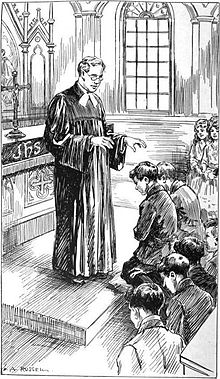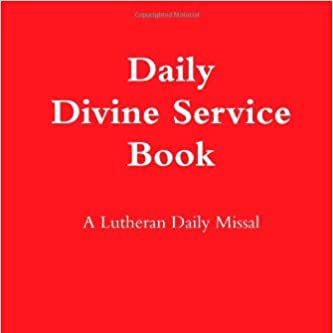
A Saint on American Soil
May 7th marks the Church’s remembrance of the heavenly birthday of a man whose life was shaped in unique ways by his unwavering confession of God’s Word: St. Carl Ferdinand Wilhelm Walther.
Born in 1811 as the son of a Lutheran pastor in Saxony, Ferdinand (as he was called by his family) followed in his father’s footsteps and was ordained at the age of 25. The Church of Saxony, however, was awash with rationalism and abandoned historic Lutheran teaching in favor of union with the Reformed. Walther saw that this structure would not enable him to carry out his ministry in a way that was faithful to the Lutheran Confessions, and so together with other Confessional Lutherans in Saxony, he emigrated to the New World to establish a church loyal to the Word of God as the Lutheran Church has always confessed it.
A gifted theologian, preacher, and teacher, Walther soon rose to prominence among the Saxons who settled in Missouri. He was subsequently selected to lead their college (now Concordia Seminary) and to be the first president of the church body they formed with other Confessional Lutherans in America (now called the Lutheran Church—Missouri Synod).
As the spiritual leader of a large group of Confessional Lutherans, this man who had left Saxony for Missouri in pursuit of a clear confession of faith was called upon to give this clear confession in his new home. Whether it was in his exchanges with J. A. A. Grabau over the Office of the Ministry or his prominent defense of Lutheran doctrine in the Election Controversy, Walther was a prominent voice for the pure doctrine of God’s Word.
On the day of his birth to life eternal, the Church gives thanks to the Holy Spirit for the way in which he used C. F. W. Walther to defend the purity of his Word and promote sound doctrine in the New World. As his spiritual descendents, his bold and uncompromising confession also reminds us of the need for clear and proper articulation of the faith in our own age.

A Brief History
While the Church’s calendar understandably has a special focus on those saints who were eyewitnesses to our Lord’s earthly ministry, it doesn’t begin and end with the early Church. Rather, it expands out from there to include our Lord’s saints from throughout all of history.
Since Walther is a nineteenth-century saint, his feast day is a relatively recent one. While Lutherans, especially in the United States, commemorated him and pointed to his example even in the years immediately following his death in 1887, it would be almost a hundred years before his name was included in the sanctoral calendar of a major Lutheran church body.
Lutheran Worship, the Missouri Synod’s hymnal published in 1982, attempted to include more recent saints in its calendar. Walther was one of these saints who was added to the calendar of saints. The tradition of commemorating this nineteenth-century saint continues in the Lutheran Service Book, the Missouri Synod’s most recent hymnal, and propers for the day were included in the Daily Divine Service Book. Thus, the commemoration of Walther’s heavenly birthday is now an established feature of the Synod’s calendar.
Collect
O God, Who didst give Blessed Ferdinand to Thy people as a minister of eternal salvation: grant, we beseech Thee, that we, who have had him for our teacher on earth, may with him enjoy Thine eternal glories; through Jesus Christ, Thy Son, our Lord, who liveth and reigneth with Thee and the Holy Ghost: ever one God, world without end. Amen.
Lessons
Epistle
Gospel
Resources
The Rev. Dr. Daniel Harmelink of Concordia Historical Institute helped us find this authentic German recipe from Lutherans in Perry County, MO where C.F.W. Walther served as pastor there.
Issues, Etc. interview with the Rev. Dr. Larry Rast on C. F. W. Walther

Propers found in Daily Divine Service Book: A Lutheran Daily Missal, edited by the Rev. Heath Curtis
References:
1. Brauer, James L. “The Church Year” in Lutheran Worship: History and Practice. Concordia Publishing House. 1993
1. Finding Aid from Concordia Historical Institute
Images:
1. Concordia Cabin College, Woodcut, unknown, United States, 1839.
2. Lutheran Clergy from Denkstein zum fünfundsiebzigjährigen Jubiläum der Missourisynode, George Mezger, 1922.




[…] one of the newer additions to the Church’s sanctoral calendar, the commemoration of C. F. W. Walther naturally doesn’t have centuries-old traditions associated with it yet. But we have to start […]